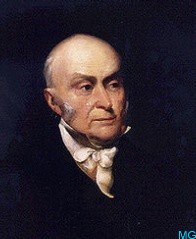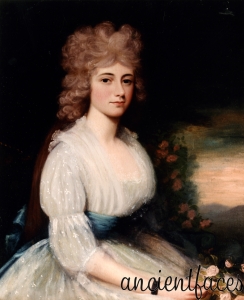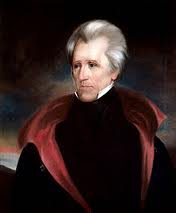In 1824, James Monroe, our last Founding Father(ish) was retiring. His Cabinet was a virtual nursery for a new generation poised to take over.
The Players and the Playing Field: 1824
Leading the field for the election of 1824, was Monroe’s Secretary of State, John Quincy Adams, a New Englander who had been on the national stage since he was little more than a boy. His credentials were impressive and impeccable. His personality, alas, was cold, caustic and usually forbidding.
Then there was William Crawford of Georgia, Secretary of the Treasury under Monroe. He was qualified and competent, but alas for him, dull as dishwater. (Money people usually are.)
Add to the mix “Harry of the West,” Kentucky’s favorite son, Henry Clay: Congressman, Speaker of the House, brawler and duelist. Not boring, though.
Include – maybe – John C. Calhoun, Yale-educated South Carolinian and Monroe’s Secretary of War. Oozing his southern charms, he was always a potentially dangerous foe.
Then, of course, there were the surprises.
Mr. and Mrs. JQA
John Quincy Adams (1768-1848) was an ambitious man, perhaps expected from birth to attain great achievement. His consort, Louisa Catherine Johnson Adams (1775-1852) was London-born, Paris-educated, raised to be exactly what she became: wife to a man of prominence.
Despite their on-paper congeniality, it was not a particularly happy marriage (at least not to Louisa). JQ’s difficult and controlling personality kept her in the background, trotted out only when she was needed. During the Monroe Administration, Adams needed her charm and social skills frequently, since First Lady Elizabeth Monroe’s “airs” made her unpopular. With the White House all but abdicating the role of social center, the home of the Secretary of State was poised to pick up the slack.
Louisa’s salons were always well-attended, and her gifts for remembering the nuances of the whos, whats and wheres were invaluable to her politically ambitious and astute husband.
The Adamses Prepare for A Ball
With the Federalist Party virtually dead, and the prevailing Democratic-Republican Party beginning to show signs of fracture (judging by the growing field of possible successors to Monroe), John Quincy Adams needed something to raise his image above his rivals.
The Tenth Anniversary of Andrew Jackson’s technically-too-late victory at the Battle of New Orleans was approaching, and the General was unquestionably the most prominent and popular man in the country. Having the Hero of New Orleans by his side would be a huge coup for any aspiring presidential candidate.
Adams decided to take full advantage of the occasion and host a grand ball in Jackson’s honor. It would be the social event of the year.
Naturally his socially talented wife would be key to its success. The problem was that it was a “last minute” decision and preparing for an occasion that required an enormous amount of preparation was mammoth.
The guest list included nearly every prominent Washingtonian, except for the Monroes, who disdained socializing in private homes. Congressmen, Senators, Cabinet members, justices and administrators, merchants, journalists and professionals, all high-ranking military officers – plus their wives and eligible sons and daughters. Hundreds of invitations were handwritten by Louisa and her female relatives and friends – and hand-delivered.
Logistics, Catering and Decorations
John Quincy and Louisa Adams lived in a reasonably large house, by Washington standards, particularly since assorted nieces and nephews on both sides of the family regularly made their home (or long-term visits) with Aunt and Uncle Adams. But the house was never designed to be occupied by hundreds!
It had to be completely emptied of all furniture. Chairs, tables, bureaus, beds and carpets all had to be removed and stored elsewhere. It would be a no-chairs, standing-room-only affair, a practice the mega-popular Dolley Madison employed at all her White House soirees a decade earlier.
Caterers, bakers, confectioners and appropriate purveyors of libation were engaged. No expense was spared. General Jackson deserved only the best.
Louisa recruited her nieces and friends to make suitable decorations and festoons. They fashioned hundreds of paper cutouts to affix to the walls, giving their furniture-less rooms an air of festivity.
The “Jackson Ball” was a whopping success, with hundreds of people crammed into John Q. and Louisa Adams’ townhouse.
General Jackson, Guest of Honor
Andrew Jackson was definitely a drawing card, but at that time and on that occasion, nobody (not even the savvy John Quincy Adams or Jackson himself) realized that he was a wild card in the pack of candidates. There were many who suspected that wily ol’ JQ wanted to recruit the popular General as his vice-presidential running mate. But of course AJ would play second fiddle to no one.
The tall, lanky General was graciousness itself as he took the gorgeously gowned and coiffed Mrs. Adams’ arm to circle the floors and exchange pleasantries with the throngs.
It was exactly what John Quincy Adams had hoped: the social event of the year. Even the partisan newspapers waxed poetic over the “Jackson Ball”, with one bit of doggerel appearing in the newspaper…
Maids and matrons, belles and madams,
All are gone to Mrs. Adams.
But there was one thing the politically intuitive Adams did not figure on. He had planned to make General Jackson his friend and ally. He did not expect to make him the rival and implacable enemy that he would become only months later.
Sources:
http://millercenter.org/president/jqadams/essays/firstlady/louisa
Allgor, Catherine – Parlor Politics: In Which the Ladies of Washington Help Build a City and a Government – Univ. of Virginia Press, 2002
Nagel, Paul C. – Descent From Glory: Four Generations of the John Adams Family – Oxfvord University Press – 1983




